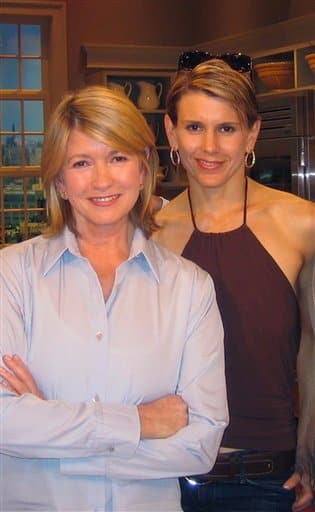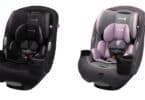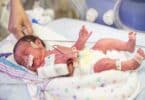Alexis Stewart, Martha Stewart’s daughter has been open about her desire to be a mom.
The 41-year-old daughter of Martha Stewart has been trying to get pregnant for two years – spending up to $27,000 a month in the last seven months alone to have a baby.
The divorced talk show host has wanted a baby since she was 37 but has been able to become pregnant.
“But when my mother got into trouble, I couldn’t think about it,” said Alexis, referring to the stock-deal scandal that sent the domestic diva to the slammer in 2004. “About two years ago, after all, that was over, I got back on track.”
But getting on track came with a big price tag.
“I’m single now, but having my own kid is the most important thing in my life, so I am trying everything I can: fancy doctors, expensive drugs, high-tech procedures,” she said. “Most people can’t afford what I am doing, I am really lucky; I know that.”
Alexis, who said she was opting for an anonymous sperm donor, told the magazine the first place she went for treatment cost about $10,000 a month.
“When I didn’t respond to the drugs after three months, they basically said, ‘Don’t bother,’ and kept asking, ‘Why don’t you use a donor egg?’ Finally, I said, ‘You’re fired.’ ”
Since December, Alexis, now like her mom a Sirius Satellite Radio talk-show host, has been going to the New York Fertility Institute in Manhattan, where drugs cost $6,000 – and the doctors and in vitro fertilization procedures about $20,000 to $27,000 a month.
“They give me, like, eight times as many drugs than the other place did to stimulate egg production, then check me every two to four days,” she said.
She said once a month she’ll inject herself with a drug that causes her to ovulate in 36 hours.
“Just before the 36 hours are up, I go to the doctor’s office and they put me under anesthesia and use an 18-inch needle to remove about 10 eggs,” she said. “Then, I go home to my apartment in TriBeCa, change and get ready for my Sirius Radio show, ‘Whatever.’ ”
The doctor, meanwhile, fertilizes the eggs, using a technique called intra-cytoplasmic sperm injection, which involves poking a hole in each egg and shoving a sperm in to create an embryo, she said.
“I’m using an anonymous donor, but not from a genius bank,” she said. “Those are creepy.”
After testing the embryos for Down syndrome and other anomalies, the doctor will try to transfer the healthy ones, she said.
“I’ve had two transfers,” she said. “They haven’t stuck . . . If there are no healthies, I try to let it go immediately, because you can go crazy. Crazy.”
“I’m trying to build up a supply of healthy embryos because, ideally, I’d love to have two kids,” she said.
Alexis divorced attorney John Cuti in 2004, explaining they were “completely ambivalent about kids.”
“Now, I no longer have the luxury of having doubts,” she said. “A child is your legacy. What better thing can you do in life than put a really good person in the world who’s going to make it a better place?
“And my mom’s just desperate. She has wanted grandchildren forever. Forever! She’s always like, ‘For my birthday, I would like you to be pregnant.’ And I’m like, ‘Me, too!’ ”








As a 35 year-old mother of 2 HEALTHY daughters, one who happens to have Down syndrome, I read with mild interest your article on Alexis Stewart’s “struggle” to have a baby. When I got to the second to last paragraph, I literally bolted straight up from my lounging position. If Miss Stewart continues to pick and choose which embryos she and her doctors see fit to implant after they “conduct an embryo biopsy for Down syndrome and the myriad other things you might find”, I imagine she’ll continue to struggle. I can’t say I’ll have much sympathy for her. I am certain that she is unaware how insulting and hurtful her comments are to those of us whose lives have been blessed and enriched by a child with Down syndrome or any other special need. Our children are not castaways. I would encourage Miss Stewart to implant all of the viable embryos and take what God gives her. Or, if she turns to adoption, why not use her tremendous means to welcome a special needs child into her family. I am sure Grandma Martha would be a great advocate for any grandchild and I think both she and her daughter would be greatly surprised at the path their life would take.
Trisomy 21 pregnancies do often carry to term, but the genetic disorder does also carry an increased risk of miscarriage.
The reduced viability of the embryos makes them poor choices for transfer, regardless of how the prospective parents feel about raising a child with Down syndrome.
I admire Alexis Stewart for being so open about a very private challenge in her life, and for subjecting herself to people’s criticisms. Perhaps she can use this struggle to encourage other women not to wait as long if they want to have their own biological baby. There are certainly different ways to become a mother, and if she wants to experience pregnancy for herself and to have her own biological baby and has the means to try, then more power to her.
Dear Jesspiz, People love to hate the infertile, it seems. Your perspective is curious, as by no theology that I know of, does G*d “give” people a child with a chromosomal issue, any more than G*d gives a child any other birth disorder.
As for adoption, I admire your advocacy. How many children have you adopted yourself? If you haven’t yet, by all means, when you start the paperwork, and the travel, and the humiliating charades in the orphanages, and when you bring your adopted child home, you can be happy about the new path your life has taken. (Now, I know I sound ridiculous, but I am not straying too far from what you yourself have said someone else “should do.”)
JuliannaKnox, I totally agree with you. Why would a person who is paying $28,000 a month on fertility treatment want to transfer an embroyo with Down Syndrome? I think that children with Down Syndrome are wonderful children, but it’s a lot of work, and I don’t think anyone who gets pregnant is keeping their fingers crossed that their child will be born with Down Syndrome or any type of genetic disorder.